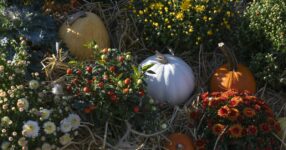
Ensure beneficial pollinators have a cozy winter home with these fall garden cleanup tips
Although there are no hard and fast rules when it comes to cleaning up your own garden or raised beds for fall, there are some new guidelines that can benefit pollinators over the winter.
And the good news is that the tips don’t require any extra work. When it comes to garden cleanup in late summer and early fall, you can just leave things as they are, especially if you have perennial plants.
If your perennials were relatively healthy with no insect or disease issues, go ahead and leave all the stems and leaves to overwinter in place. Doing so creates perfect housing for pollinating and beneficial insects and other creatures. They will move in and call it home.
Though, there has been a fair amount of plant disease due to wet and humid conditions, and you may want to remove some of that foliage if your perennials were affected. If so, wait until the foliage drops on its own, then remove the diseased leaves but leave the stems for insects to overwinter in.
And the same is true for your annual and vegetable gardens. If you have tomatoes, squash, cucumbers and zinnias that are all heavily diseased, cut them off at the ground level and remove that from that garden.
After you remove any diseased leaves, you might try to sow a cover crop. That’s the kind of planting that you put in your gardens with no intention of harvesting. If you’re in the warmer sections of the Champlain Valley or in the lower Connecticut River Valley, it’s still warm enough to sow peas, oats, winter rye, winter wheat or crimson clover.
By planting these cover crops now, they’ll have a month or two to grow then they will all naturally die back in winter. When they do, these plants will help protect the soil over the winter. Come spring, no need to dig or till, just go ahead and plant new things.
And this type of “no-dig” or “no-till” gardening lets the microbes grow underneath throughout the winter and use up all the nutrients that your fall-planted cover crop will provide.
However, if cover crops aren’t your thing, you can always just use chopped up leaves or grass clippings from untreated lawns to cover your gardens and beds. Even hay and straw work well. This organic layer will help protect your soil all winter long. Also, adding about an inch of compost around your perennial gardens, trees and shrubs provides a good layer of protection.
And while you’re getting your gardens and beds ready for winter, this is a good time to see just how fertile your soil really is. This can be determined by sending your soil in for testing (the University of Vermont Extension Service does soil testing for a nominal fee).
The last task on your garden cleanup list might be the most fun: plant! Your favorite garden center probably has good sales on perennials, trees and shrubs right now, so it’s a good time to go purchase a few. Put them in the ground, keep them well watered, and they’ll have a good couple months to get established before the winter hits.
A question about broccoli plants

Courtesy, Charlie Nardozzi
Q: What happened to my broccoli? One plant is okay, but four others are like this in the picture. Some have small yellow flowers. – Jeanette, in Essex Junction
A: The damage on your broccoli plants is from an insect called the Swede midge. It’s a small aphid-like insect that burrows into the growth points of brassicas like broccoli, cauliflower, cabbage, Brussels sprouts and kale.
The Swede midge does its damage by burrowing into brassicas’ growth point, and that deforms the plant and vegetable.
This insect is becoming more and more of a problem, though there are some ways to control it. You could rotate your beds. That means, next year, refrain from planting brassicas in the same place. Don’t plant brassicas in the same space for another three or four years to help reduce the Swede midge population there.
Next spring, try planting in a new bed, add some compost, and then immediately after planting, place a row cover over it, like one made from micro-mesh. This will create a barrier so the adult fly can’t lay eggs in there and that can protect your plants.
All Things Gardening is powered by you, our audience! Send us your toughest conundrums and join the fun. Email your question to gardening@vermontpublic.org or better yet, leave a voicemail with your gardening question so we can use your voice on the air! Call Vermont Public at 1-800-639-2192.



